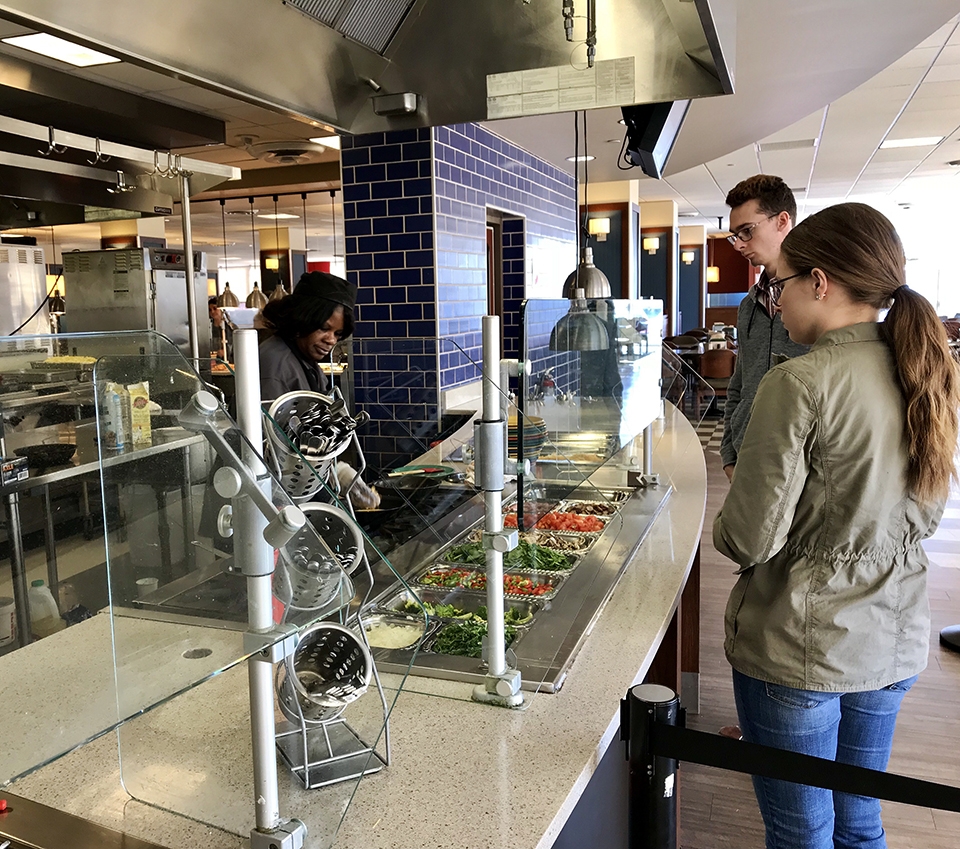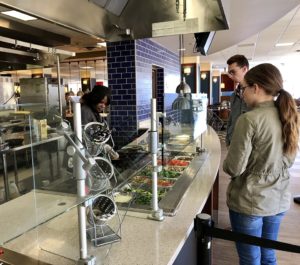

Food options at DU have long since been a source of stress and conflict for students who abide by dietary restrictions, as the dining halls often fail to accomodate different food-related needs.
03/01/2018
By Ollie Gratzinger | Features Editor
Food: We eat it almost as often as I complain about it.
In 2016, Jamie Moore, Parkhurst’s director of sourcing and sustainability, spoke with the Terra learning community and took questions regarding the nature of food at Duquesne.
Questions ranged from the general to the decidedly specific, addressing issues such as waste, factory farming and product sourcing. It was a compact and informative discussion, but one question and its answer stood out.
“Are your meats kosher?”
“We don’t currently source any kosher meats for Duquesne University,” Moore said. “If we had students that adhere to kosher, I would assume we would then locate a source, but at this time, there isn’t a need.”
But with Lent upon us again and Friday fish-fry events popping up at every local church (and in the third floor Union Concourse courtesy of Phi Kappa Theta), some Jewish students are left feeling cheated, somehow, wondering why there still “isn’t a need” for their community’s representation on campus despite the reality that we are, in fact, here.
I get that Duquesne is a Catholic school. Let’s even assume that most of its students are Catholic. Still, there are some that aren’t, and their needs aren’t being met. A Catholic student can go down into Hogan Dining Center on a Friday evening (presuming it’s actually open) and grab some sort of fish-based dinner well within the parameters of their faith. It’s excellent that they have that opportunity, but a Jewish student wandering around the same dining hall might have a much harder time.
Kosher eating doesn’t just exclude pork, contrary to common belief. Shrimp, crab, lobster and other shellfish aren’t allowed, and neither are any eggs containing blood spots or any other food items containing gelatin, as gelatin is made from extracting collagen from the bones and skins of (often non-kosher) animals.
A meat’s kosher-ness or lack thereof is also defined by how the meat is obtained. Jewish law prohibits causing pain to an animal, and, therefore, a slaughtered animal isn’t kosher unless it experienced an instantaneous and effectively pain-free death. There exists a debate among Jews that abide by kashrut, or the Jewish laws involving food, addressing whether or not any factory-farmed meat can be kosher. Traditionally devout Jews separate the consumption of meat and dairy. Don’t even get me started on special occasions like Passover, where bread, rice, corn, peanuts, mustard and anything else chametz or kitniyot is suddenly forbidden.
As you can probably tell, kosher means a whole lot more than pork-free.
There are, of course, varying levels of kashrut observance, and maybe it’s probable that Jewish students that choose to attend Duquesne won’t oppose a cheeseburger. But that isn’t the point.
The point is that there exists a general issue in America where “religious expression” is almost always deemed synonymous with “Christian expression.” Again, I get it. Duquesne is a Catholic school. Maybe it isn’t fair to complain about a lack of accommodations for non-Christian students. Maybe I “knew what I signed up for,” as I’ve often been told by some of my (Catholic) peers. Maybe I should “just be a vegetarian.”
But nevertheless, it wouldn’t bankrupt a university that rakes in about $30,000 to $50,000 per student to offer something. Throw me a bone here, Duquesne. Preferably one not from a pig. Would providing meat from one kosher supplier really be that much harder than finding a bunch of fish to fry in the dead of winter?
Somehow, I doubt it.




